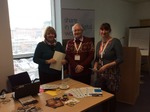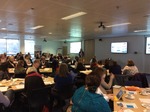The second European conference on information literacy took place in Dubrovnik this year. Bill Johnston was the rapporteur for the conference this year and with his permission I enclose his summary of all 175 abstracts from the conference. It is an excellent summary of the conference content.
John Crawford
ECIL 2014
Commentary on the Abstracts
Bill Johnston, Honorary Research Fellow, Centre for Lifelong Learning, University of Strathclyde, Scotland, UK b.johnston@strath.ac.uk
The following impressions are based on my reading of the abstracts for papers, posters, pecha kucha sessions, workshops and panels accepted for ECIL 2014.
During the conference I will be accessing a variety of sessions in order to present my further impressions and conclusions in the closing session of the conference. I look forward to meeting colleagues and hearing their views on the current status of information literacy and the directions for future research, practice and advocacy.
Introduction – What are we talking about in 2014?
The elements which constitute information literacy, as described in the abstracts, are mainly based on long-standing accounts of information literacy, such as those entailed in the ACRL Standards, Big6 model and other professional contributions. Consequently ‘assessing’ ‘searching’ ’ managing’ ‘evaluating’ ‘applying’ etc. are recurring key terms used to express the concept of information literacy. Additional terms in use include:
- digital literacy;
- health literacy;
- visual literacy;
- infographics;
- media and information literacy;
- information behaviour;
- trans-literacy;
- post-literacy.
This range of terms suggests an opportunity for a focused debate on the nature and scope of information literacy at this point in time.
A frequently used framing strategy in the writing of the abstracts is to position the significance of information literacy in relation to broader notions of:
- information society;
- digital society;
- multimedia society;
- knowledge economy;
- the 21st century.
These entities may suggest a relatively homogeneous perspective, with connotations of a particular kind of socio-technological formation and political economy. However complementary and alternative conceptions of information literacy are represented in the abstracts, which should serve to extend the discussion. For example:
- indigenous perspectives;
- post-colonial experiences;
- critical information literacy;
- socio-cultural interpretations of information literacy;
- radical information literacy;
- Green perspective.
Again an opportunity to discuss where and how information literacy connects to wider social and economic formulations and movements.
In essence we have the opportunity to talk about not only the micro levels of information literacy experiences, individual’s searching for example, but also the broader social, cultural and historical contexts that encompass them.
Methodological Features
A number of studies are founded on research, with a mix of qualitative and quantitative methods in use. Research approaches and designs include:
- correlations between a chosen population’s perceptions and capacities, and an established professional/governmental framework for information literacy;
- comparative evaluations of specific technologies and course designs;
- phenomenography;
- ethnography;
- action research;
- grounded theory;
- bibliometric analysis and systematic literature reviews
Equally a number of the studies offer detailed accounts of projects, new service designs and collaborative initiatives aimed at improving practice and raising the profile of information literacy in particular institutions.
Universities
The bulk of contributions is from higher education institutions and mainly constituted by examples from university library practice. They illuminate multiple aspects of academic practice including:
- adoption of educational theory and concepts as a basis for pedagogical decision making;
- introduction of relatively new constructs, such as ‘Threshold Concepts’;
- expanding/evaluating the range of technologies, particularly mobile devices, entailed by blended learning;
- gameification of instructional design and teaching practice;
- emphasis on active, collaborative, inquiry-based pedagogy to engender independent learning, critical thinking and a wider range of academic and professional skill;
- acknowledgment of the importance of systematic course design as a key element of academic practice;
- focus on assessment of learning;
- specific initiatives for postgraduates and post doctoral students;
- discipline specific examples, including LIS education programmes;
- dealing with plagiarism and academic dishonesty.
Dissatisfaction with ‘one-shot’ teaching sessions is evident and linked to moves to develop longer sequences of integrated activities, with a much greater engagement with disciplinary and professional curricula and university-wide values and strategic objectives. Consequently there is attention to larger units of analysis and action such as Freshman/First Year Experience initiatives, and institution/department-wide reform and re-design of curricula.
It seems clear that many university librarians are determined to make their universities more information literate, and to do this by moving their teaching and instructional services forward as part of educational development in their organisations.
Primary and Secondary Schools
A significant number of contributions focus on this sector and include:
- implementation of national curricula;
- teacher/librarian collaboration;
- inclusion of parents and families in supporting pupils;
- online ‘risks’ and ‘safety’;
- entailing information and other literacies in curricula and school practice;
- measures to improve pupil information literacy;
Public Libraries
Whilst there are a small number of contributions, there is a strong sense of ‘mission’ to provide information rich environments for the widest range of patrons to meet their varied purposes, and to foster the skilled use of information technologies in the service of that mission. There is an equally strong sense of combating inequality and helping marginalised sections of the community. Given the capacity of public libraries to impact large and varied populations, the number of contributions should not be taken as a potential weakness for the conference.
National Studies
A variety of studies are provided including:
- information literacy in citizen development;
- public libraries contribution to socioeconomic inclusion;
- sectoral and cross-sectoral overviews of information literacy policy and practice;
- whole age group studies;
- specialist groups studies;
- historical accounts of information literacy;
- development of a professional community of practice for information literacy;
- database development;
- implications of copyright legislation.
The range of national origins of these contributions goes beyond the formal borders of Europe and underlines the strong international character of the conference.
Themes
The themes I identified are diverse; some are discussed singly in their own right, whilst others are entailed in particular contexts. Themes include:
- nature and definition of information literacy;
- relations between research and practice;
- nature and meaning of ‘reading’ in understanding information literacy;
- implications of changes in copyright arrangements in digital publishing;
- generational approaches, seniors as well as younger age groups;
- media socialisation.
Conclusion – Where are we going in 2014?
It is difficult to sum up the riches promised by the abstracts, however my short formulation of the direction of travel is – creating information literacy and lifelong learning for digital citizenship in the 21st century.
Bill Johnston
12/09/14
 Tuesday, March 3, 2015 at 9:50PM
Tuesday, March 3, 2015 at 9:50PM  Morag Higgison, John Crawford, Lauren Smith at the Il Symposium 2015
Morag Higgison, John Crawford, Lauren Smith at the Il Symposium 2015 IL Symposium, 13/02/2015The conference on February 13th at Atlantic Quay in Glasgow seems to have been a success, judging by informal feedback. One of its main aims was to bring together people from a range of sectors so that they could understand each other’s problems and understand how IL can help to solve them. Bill Johnston, Ian McCracken and I are meeting with SLIC staff next Monday to review feedback and consider what to do next.
IL Symposium, 13/02/2015The conference on February 13th at Atlantic Quay in Glasgow seems to have been a success, judging by informal feedback. One of its main aims was to bring together people from a range of sectors so that they could understand each other’s problems and understand how IL can help to solve them. Bill Johnston, Ian McCracken and I are meeting with SLIC staff next Monday to review feedback and consider what to do next. 
